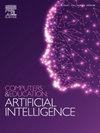The mediating role of academic stress, critical thinking and performance expectations in the influence of academic self-efficacy on AI dependence: Case study in college students
Q1 Social Sciences
Computers and Education Artificial Intelligence
Pub Date : 2025-02-04
DOI:10.1016/j.caeai.2025.100381
引用次数: 0
Abstract
This study investigated the mediating roles of academic stress, critical thinking, and performance expectations in the relationship between academic self-efficacy and AI dependency among university students. Data were collected via validated instruments and analyzed via structural equation modeling (PLS-SEM) in a cross-sectional study that included 676 students from six universities in northern Peru. The findings indicated that the relationship between academic self-efficacy and AI dependency was substantially mediated by academic stress (β = 0.398, p < 0.001). Furthermore, this relationship is serially mediated by academic stress and performance expectations (β = 0.325, p < 0.001). Academic self-efficacy also had a direct and significant effect on AI dependency (β = 0.444, p < 0.001). Paths that utilized critical thinking as a mediator were not statistically significant, contrary to expectations. The model accounted for 58.9% of the variance in AI dependency. These results indicate that students' levels of AI dependency are significantly influenced by psychological factors, including academic stress and performance expectations. This research contributes to the comprehension of the psychological processes that underlie the adoption of AI in higher education. It also offers valuable insights for the development of interventions that foster balanced AI use while enhancing academic self-efficacy.
求助全文
约1分钟内获得全文
求助全文
来源期刊

Computers and Education Artificial Intelligence
Social Sciences-Education
CiteScore
16.80
自引率
0.00%
发文量
66
审稿时长
50 days
 求助内容:
求助内容: 应助结果提醒方式:
应助结果提醒方式:


